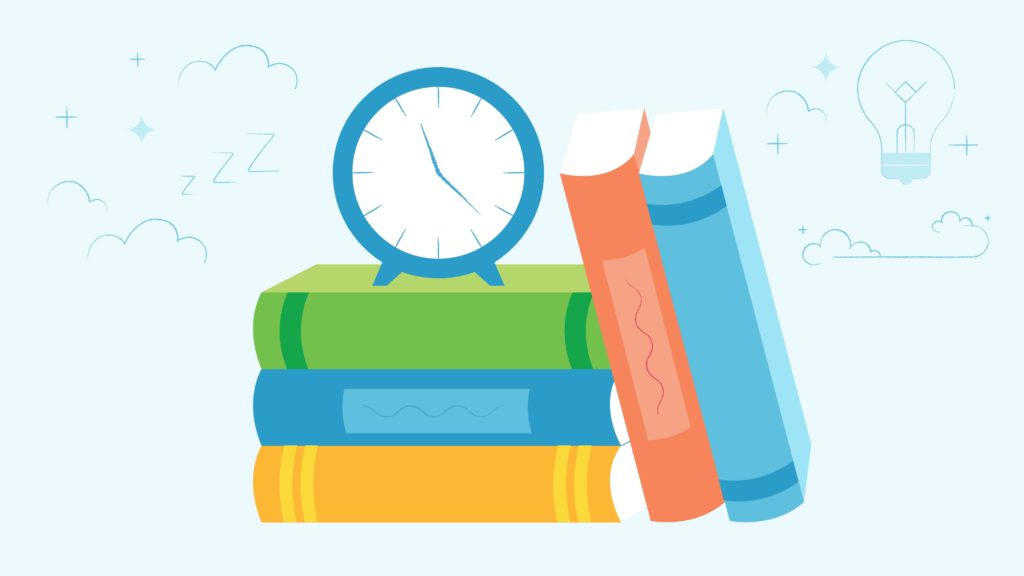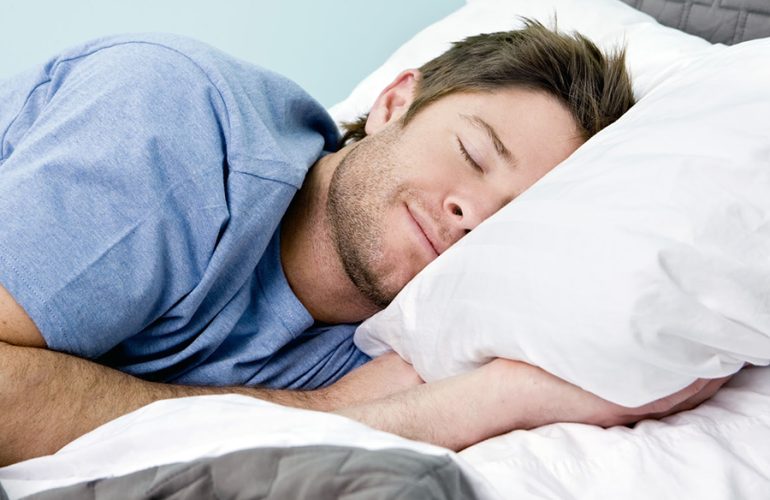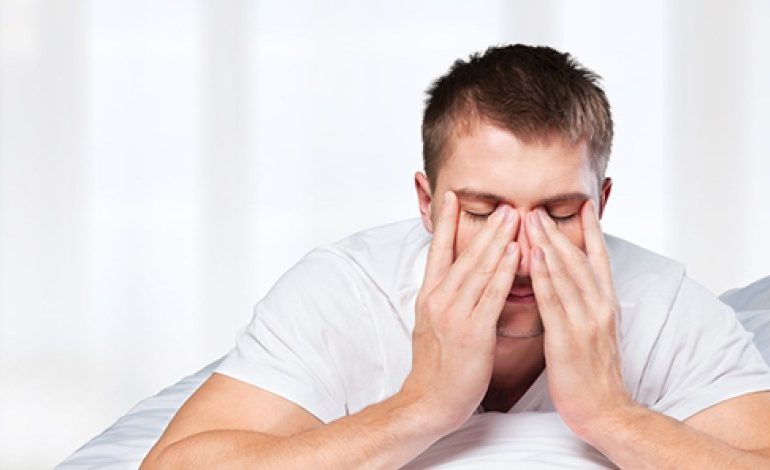If you’re a hard-working student, you know how tricky it is to prioritize sleep over all the other things on your to-do list. School can consume every part of the day, and it’s difficult to get even the minimum recommended hours of sleep you need to function.
While it may seem easy to put sleep on the back-burner, doing so can cause negative a ripple effect, leading to more serious health issues and even poor performance in school. So it’s safe to say that investing in a good night’s sleep is actually one of the best things you can do for your grades and your mental well-being.
Our article will break down everything you need to know about sleep health, its effects on your mental capacity, and time management tips to help you get more sleep.
Why Are Students So Sleep-Deprived?
Juggling school, work, a social life, and your health is one of the hardest things about being a student. It all comes down to time management— and based on the statistics, Americans aren’t putting sleep at the top of their list.
According to the Centers for Disease Control and Prevention (CDC), 1 in 3 adults in the United States are not getting enough sleep. The American Academy of Sleep Medicine and Sleep Research recommends adults ages 18-60 get at least 7 hours of sleep every night— snoozing for less can lead to even more serious health problems beyond fatigue.
While age is a factor in how much sleep you should be getting, other things could be affecting your sleep quality, such as your sleeping position, your mattress, existing illness, and your sleep hygiene habits.
Students, in particular, are prone to sleep deprivation because of their hectic schedules, and they often rely on caffeine or energy drinks to stay awake well past a reasonable hour to cram for tests or study.
They also face lots of distractions, especially in the age of technology, and most of them have erratic sleep schedules, particularly on the weekends. Combine that with early class times and stress, and you have the perfect storm for poor sleep health.
What Happens When You Sleep?
Sleeping is one of those things most of us don’t really think about— we naturally want to fall asleep when our body sends us specific signals. But what really happens when you sleep?
You probably don’t remember most of it, but lots of crucial processes happen as soon as you shut your eyes.
The Sleep Cycle
There are four stages of sleep, and each does something different for your body. One sleep cycle (all four stages) takes approximately 110 minutes from start to finish. During your first few cycles, your NREM stage (the most restorative stage) is shorter, but it gets longer throughout the night. That’s why staying asleep—not just getting to sleep— is so crucial.
When it’s time to sleep, your brain releases GABA, a chemical that essentially tells your body it’s time to go to bed. The brain stem also sends signals to the muscles to relax.
Stages 1 prepares you for sleep. It’s common when you go without sleep for 24 hours to dip into Stage 1 frequently, albeit briefly. During Stage 1, you start to doze off and your muscles relax. You might drift in and out of sleep here, and if you’re not close to your bed, you run the risk of falling asleep in an uncomfortable position.
In Stage 2, NREM (Non-REM) sleep begins. It’s more difficult to be aroused from sleep during this stage, and your brain waves begin to produce bursts known as sleep spindles. These spindles work together with K-complexes (another type of brain wave) to protect you from being woken up— in other words, they tell your brain not to signal you if there’s danger. They are also thought to convert your short-term memories to long-term ones.
Your body temperature will start to naturally decrease and your heart rate will slow down.
NREM sleep occurs during Stage 3. This is the deepest and most restorative stage of sleep. If you miss this stage, you will feel a difference in the morning— and not in a good way. In this stage, your body repairs muscles, replenishes lost energy, and boosts your immune function. You need this stage to recover from the previous hours you spent awake.
During Stage 3 sleep, your body is working to rid your brain of waste that, if built up over time, can lead to brain disorders such as Alzheimer’s.
Finally, during the REM stage, you experience dreams and your eyes move back and forth quickly (hence the name of the stage— Rapid Eye Movement). You only spend about 90-120 minutes in this stage, and some adults experience REM 3-5 times per night. It’s easier to be aroused from sleep during this stage, but if you do wake up, you’ll feel groggy.
How Sleep Changes With Age
Our body’s needs change as we grow up, and as a result, so do our sleep habits and preferences. Fortunately, your body will usually tell you how much sleep you need— you’ll feel tired when it’s time for bed and your body should wake up on its own after it’s gotten enough rest. Unfortunately, many of us ignore these signals and our sleep schedules get thrown off.
Babies
Newborns (0-4 months) and infants (4-12 months) sleep more than the rest of us. Newborns spend about 8-9 hours of the daytime sleeping and 8 hours asleep every night. As any parent knows, not all babies sleep through the night— their erratic sleeping schedules are often correlated with their need to eat.
By the time a baby reaches 1 year old, they usually have a more consistent sleep schedule. They sleep about 10-13 hours a day, including naps. Even babies need routines to learn how to put themselves to sleep.
A study published in the journal Pediatrics looked at the sleeping patterns of two different groups of infants— one group had no set routine, while the other did. Those with a routine experienced less stress and anxiety, and they woke up less frequently. After one year, the researchers saw no issues with attachment between the parents and children who had a set routine. Sleep habits learned in childhood can overlap into adolescence.
Adolescents and Young Adults
High school and college students are busy, but they are also at an age where they need far more sleep than they typically get.
High school students need a minimum of 8 hours per night, and some say up to 10 hours are best for optimal health. That’s because adolescents’ circadian rhythms shift drastically during puberty— for example, a teenager who used to fall asleep around 9 p.m. would begin to fall asleep around 11 p.m., and they’d wake up 2 hours later. This shift can throw off sleep quite a bit, especially if the student starts school early in the morning.
College students need 7-9 hours of sleep to stay on top of their extracurricular activities and studies. The University of Georgia Health Center states most college students only get 6-6.9 hours of sleep on average, which means most of them are getting much less than that. This deficit can cause grades to drop, not to mention mental health quality.
Creating a schedule and sticking to it is just one of the ways students can get more restorative sleep. Other keys to better sleep are managing stress, creating an environment more conducive to sleep, and setting aside enough time for proper rest. Before we list some tips to help you sleep better, let’s go over what happens when you skip sleep in favor of an all-night study session.
Seniors
Lots of physical changes happen with age, and most of them are beyond our control. However, studies have found that those who spent much of their adulthood sleep-deprived are more likely to develop memory problems in older age.
Earlier, we broke down the different processes the brain goes through during deep sleep— one of these involves converting short-term memory to long-term memory. If you skip deep sleep often, you will soon have a harder time making new memories. Your brain will also skip the “waste disposal” cycle it goes through during sleep, and harmful plaque will begin to build up.
Since we do have control over how much we sleep, this is good news! It all seems to come down to establishing healthy sleep habits when we’re young and sticking to them through adulthood.
Negative Effects of “All-Nighters”
All of us have missed out on sleep occasionally, but continually depriving your body of the rest it needs has long-term consequences. Sleep is a key restorative process your body needs to organize the day’s events, repair and regenerate cells, and replenish the energy you spent during the day.
As you can imagine, skipping this process leads to a reversal of the aforementioned benefits— lagging mental alertness, depression or mood swings, and even an increased susceptibility to infection and disease. Sleep deprivation over a long period of time can lead to increased obesity risk, heart disease, and high blood pressure.
24 Hours Without Sleep
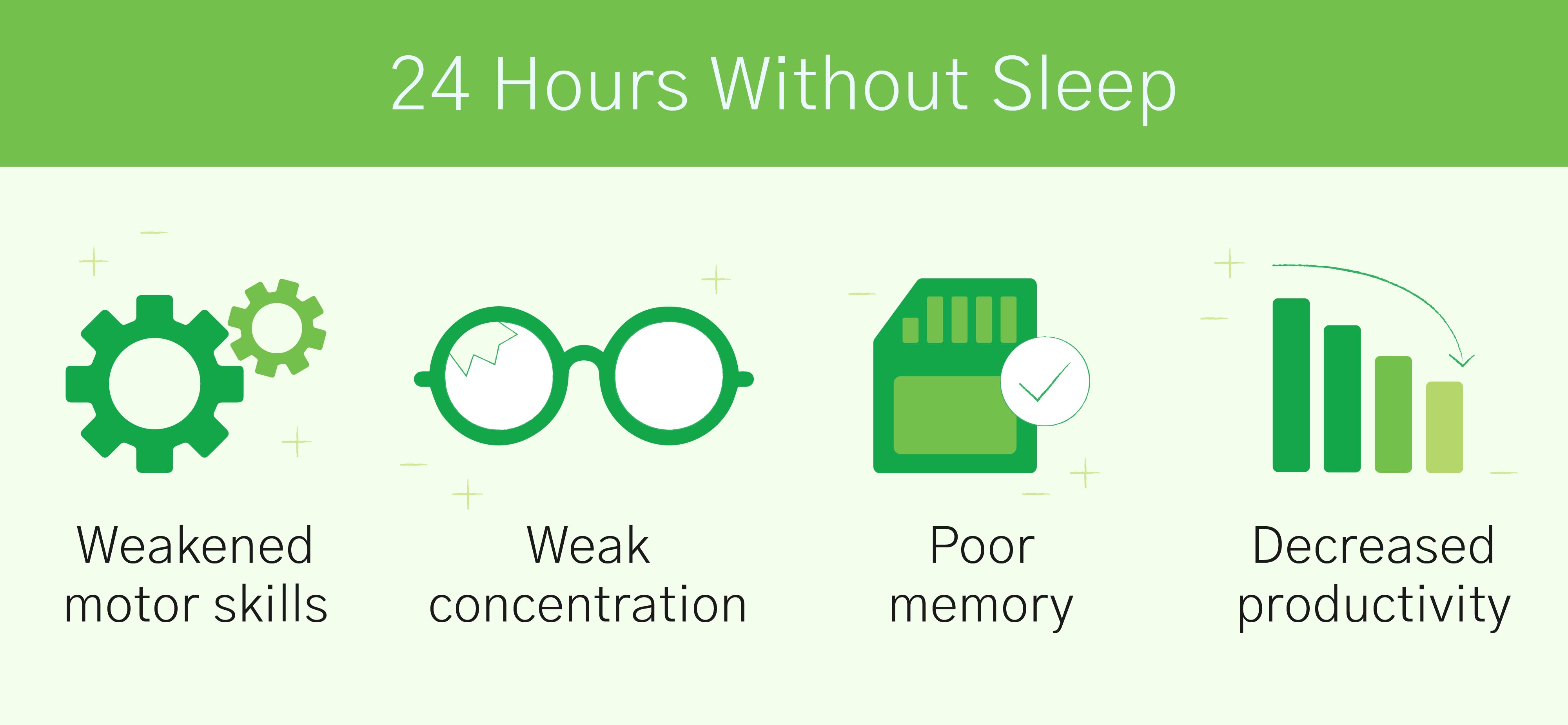
So, you did it— you pulled off an all-nighter. How do you feel? If you used energy drinks or caffeine to stay awake, you may not be feeling the effects yet, but soon your body will crash. Fatigue will begin to set in and debilitate your basic motor skills. It will be much harder for you to concentrate— a bad thing for anyone, but especially for students who need to focus in class.
Since you didn’t experience deep sleep, your brain may struggle to retain any new information— so much for memorizing those flashcards! After 24 hours without sleep, it can be hard to make decisions. That’s because the part of your brain which carries out executive functions, or helps you make judgments, is lagging behind.
In short, an all-nighter will make your productivity levels drop down to zero.
More than 24 Hours Without Sleep
After you stay awake for an entire day, your body will do anything it can to force you into sleep. If you resist or take more supplements to keep yourself awake, some interesting things will begin to occur.
You will begin to nod off more frequently— this is known as “microsleep.” As you can imagine, microsleep is not that restorative and it can lead to you falling asleep in some uncomfortable positions or places. For example, if you nod off in the library, you could wake up with a stiff neck or sore joints.
Long-Term Effects of Sleep Deprivation
Now that your eyes are open to the short-term effects of sleep deprivation, let’s talk about what happens after you miss out on sleep over a long period of time.
There are three main types of research that can help us understand the link between sleep deprivation and our health:
The first type involves intentionally depriving the research subjects of sleep and then examining the after-effects. These studies have uncovered patterns such as increased stress, increased blood pressure, impaired blood glucose control, and increased inflammation.
The second type of study questions participants about their sleep habits using a survey— this type seeks to examine the effects of sleep deprivation on certain populations.
The third type tracks participants’ sleep habits over long periods of time, linking poor sleep with a higher incidence of diseases later in life.
All three research types have helped us more clearly see the link between poor health and poor sleep patterns, and they further prove we can’t ignore our sleep without experiencing detrimental health problems.
Benefits of Healthy Sleep
Most of us know the benefits of getting enough sleep because we know what it’s like to be without it. When we’re well-rested, we have more energy, can think more clearly, and even make healthier eating choices.
Brain Health
According to Matthew Walker, a brain scientist and professor at UC-Berkeley, sleep isn’t just something we like to do when we’re tired. Its positive effects can determine your health in old age, as evidenced by a handful of peer-reviewed studies.
The sleep spindles created by the brain during the second phase of your sleep cycle “convert” your short-term memories to long ones. Missing out on this key process during sleep can affect your memory as soon as the next day— that’s why you might find it harder to retain information when you’re sleep-deprived.
So, even if you think you’re doing your grades a favor by staying up late and cramming, you’re actually weakening your memory. This isn’t just a nice suggestion— it’s backed by science. A study published in Scientific Reports concluded that irregular sleep schedules are linked to poorer academic performance. In short, if you want better grades and sharper focus, make time for a complete night of sleep every night.
Nutritious Food Choices
Healthy sleep also affects your appetite. Leptin is a hormone your body secretes to tell your brain it’s “full.” Ghrelin is the brain chemical triggering the opposite effect— it signals your body that it’s time to eat. If your body is trying to digest a large, late meal, this will interrupt your sleep cycle. What’s more, when you’re tired the next day, you’re more likely to choose sugary, fatty foods that don’t promote sleep.
Studies have shown extreme sleep deprivation (only 4 hours of sleep each night) increases ghrelin levels, and leptin levels plummet. Consuming higher-calorie foods to replenish your appetite can lead to belly fat accumulation, a precursor to diabetes. One study found that six nights of sleep with only four hours of sleep each night inhibited glucose tolerance. When the study participants went back to 8-9 hours of sleep, their glucose tolerance returned.
A study published in JAMA Psychiatry discovered children and adolescents are at a higher risk for increased obesity if they skip REM sleep.
Boosted Immunity
In 2007, the International Agency for Research on Cancer classified shift work that causes sleep loss as a possible carcinogen— after one night of 4-5 hours of sleep, there is a 70% reduction in cancer-fighting cells. Their study found that short-term interruptions of sleep during a 24-hour circadian rhythm (including exposure to light and darkness at abnormal times) mimics “jet lag.”
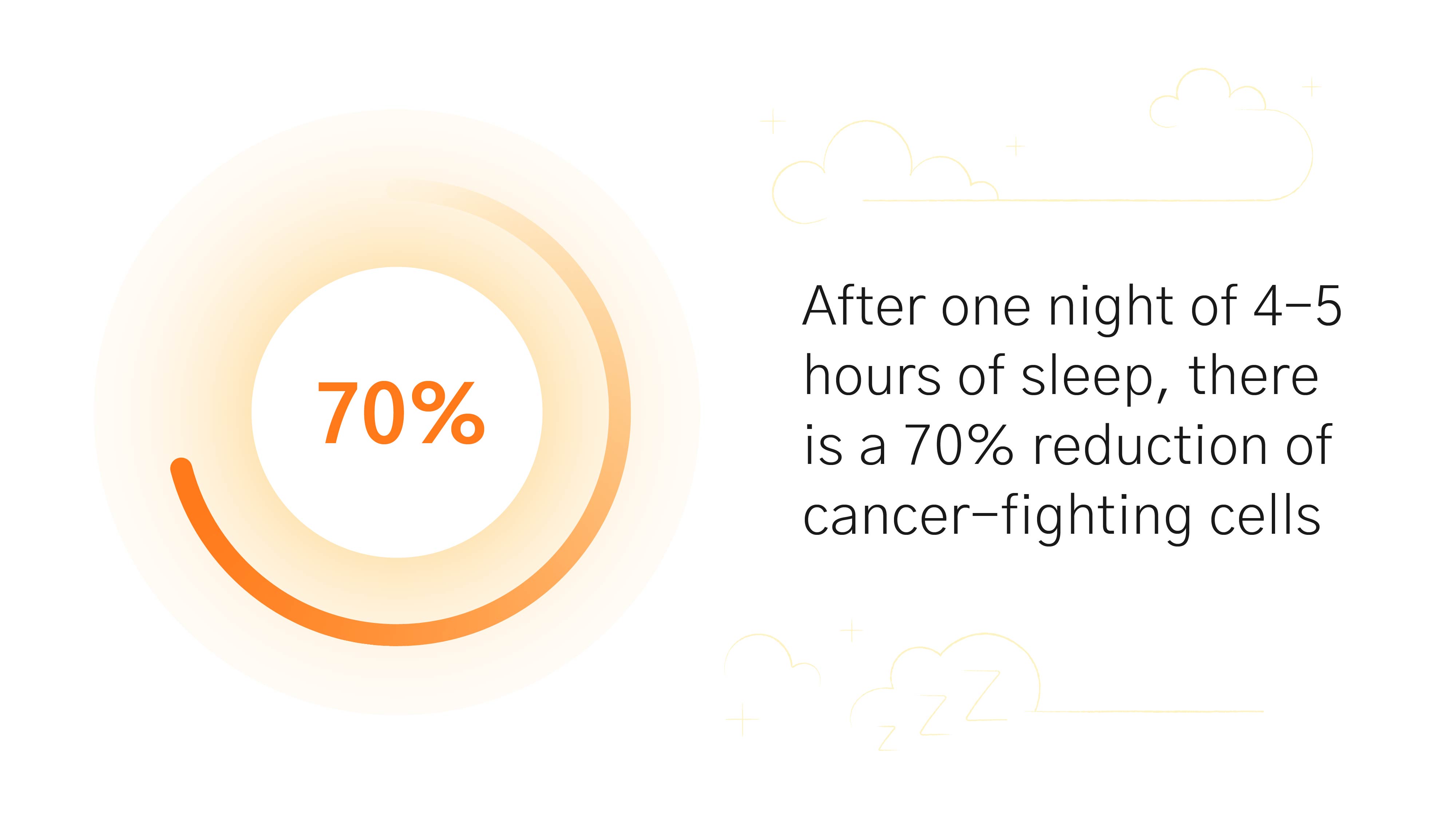
Even if they aren’t working while in school, full-time students’ erratic sleep schedules are similar to that of people who work graveyard shifts, especially if the students are consistently pulling all-nighters.
Students with full sleep reserves are also less likely to catch viruses like the common cold or flu. That’s because your immune system releases cytokines during sleep— cytokines work to suppress infection, inflammation, and stress. Without deep sleep, your cytokine levels are low, and you’re more susceptible to getting sick— putting you at risk to miss class, assignment due dates, and exams.
Less Stress
If you’ve experienced finals week as a student, you know poor sleep and stress go hand in hand during that busy time. It turns out that the link between the two isn’t just coincidental— poor sleep leads to an increase of cortisol, the stress hormone. What’s more, increased cortisol can result in insomnia, perpetuating a cycle of sleepless nights.
Your cortisol naturally drops throughout the day to prepare you for sleep; increased cortisol close to bedtime doesn’t just lead to sleeplessness, but it also promotes insulin resistance and poor thyroid function— both of which can lead to obesity, diabetes, anxiety, depression, and more.
Better Mental Health
You probably know by now that lack of sleep leaves you feeling more anxious (thanks to the increase in cortisol), but that’s not the only side effect you should worry about.
A study published in 2015 found that insufficient sleep led to increased depression and hopelessness, especially in teenagers. According to the World Health Organization (WHO), depression is the leading cause of disability worldwide. It’s a common condition affecting students, especially first-year students who experience lots of changes and adjustments to their lives and schedule.
Researchers have noted that anxiety has begun to increase rapidly among students in the past 10 years. Between 2008 and 2016, the incidence of anxiety diagnoses in students doubled from 10% to 20%. While there are many factors contributing to mental wellness, getting enough sleep seems to be one of the keys to better overall wellness, including mental health.
Tips for Getting the Most Out of Your Sleep
Getting enough sleep isn’t as hard as it may seem— it all comes down to establishing better time management habits and making sleep a priority.
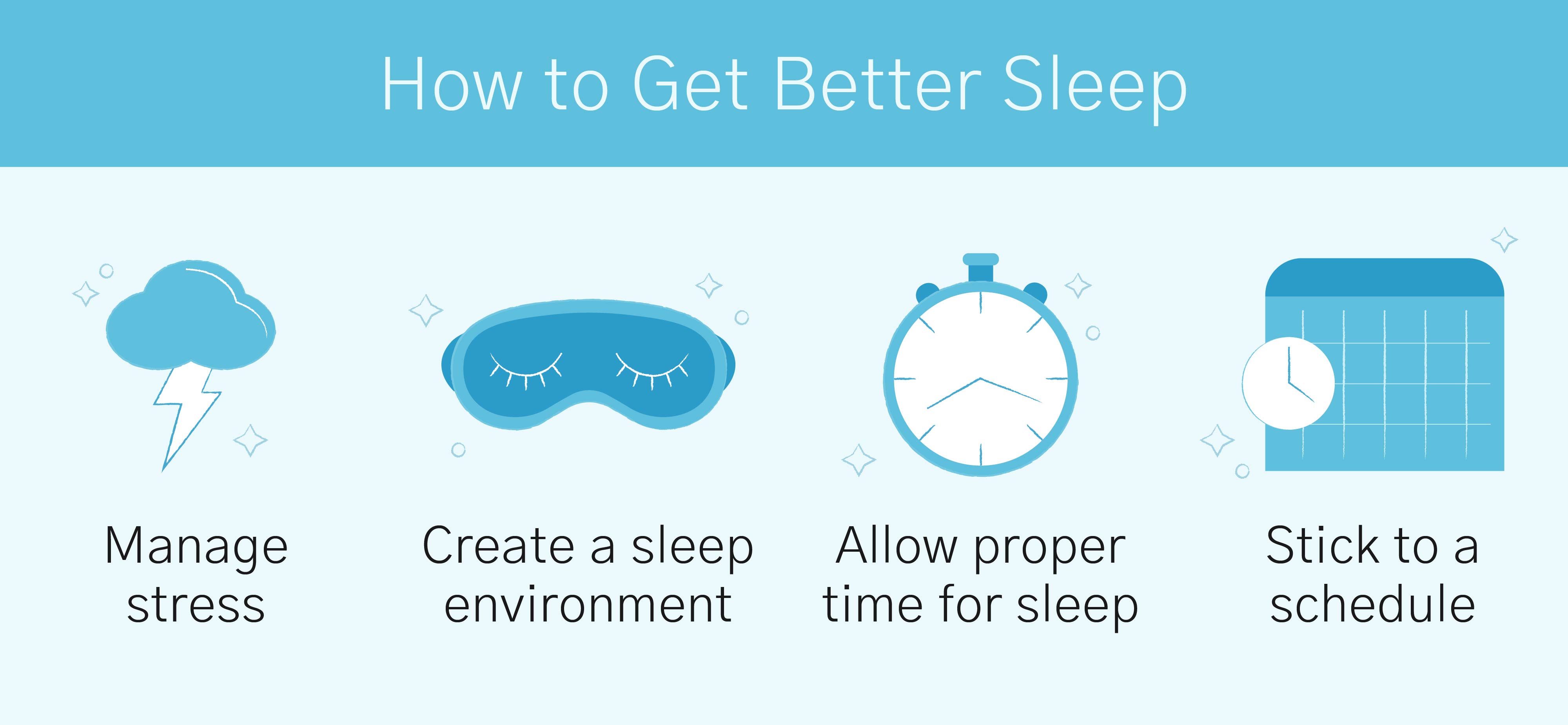
Take Naps
Yes, short naps are good for you! Just don’t go overboard. One study published in the journal Sleep observed 24 healthy young adults and the effects of different nap-lengths on their health (measuring such things as fatigue and cognitive performance).
The results revealed that a 10-20 minute nap resulted in the most improvement. Naps that lasted 30 minutes long actually made the participants more groggy and less alert. Essentially, power naps, or cat naps, are more effective than long naps.
Be careful to time your naps in the middle of the day as well since naps close to bedtime can disrupt your evening sleep cycle. Aim for naps before 3 pm.
Stick to Your Sleep Schedule
Earlier in the article, we mentioned that infants and newborns with consistent sleep schedules are more likely to have healthy sleep habits as they get older. Like any habit, it takes some time to get used to a good bedtime routine, but unfortunately, it takes very little effort to break that cycle.
Students are susceptible to changes in their routine because of after-school activities, exams, group meetings, and more. What’s more, their class schedule changes every semester, and they don’t always have control over class start times. Is it even possible for students to establish a healthy sleep routine?
While you can’t always control every aspect of your daily schedule, you can do little things during the day to ensure you get those critical hours of rest at night.
Moderate Your Caffeine Consumption
A study published in the Journal of Clinical Sleep Medicine looked at the effects of caffeine 0, 3, and 6 hours before bed— it concluded that caffeine consumption as soon as 6 hours before bed can interrupt a sleep cycle.
Try to limit any caffeine consumption to at least 6 hours before bed so you don’t risk throwing off your sleep schedule later on— this includes coffee, energy drinks, or caffeinated teas.
Set Up An Ideal Sleep Environment
Your sleep environment plays a large part in your sleep patterns— while it’s convenient to fall asleep right where you’re standing, it’s not exactly comfortable or conducive to deep sleep.
If you can, use blackout curtains in your bedroom so your body will begin to recognize it’s time for rest. Your circadian rhythm relies on the light of the sun, which tells your body when it’s time to be awake and when it’s time to go to sleep. One group of researchers at the Institute of Cancer Research learned that sleep disruptions due to light can lead to obesity.
If you like to read a book to prepare for bed, use warm light— blue-light emitting devices (common in computer screens, phones, and tablets) are known to disrupt the REM cycle because they suppress melatonin secretion. In fact, blue light can shift someone’s sleep cycle by up to 3 hours!
Not only are electronic devices too bright for bedtime, but using them too much can increase anxiety. One study at UC Berkeley discovered that students who spend more than 20 hours of downtime per week in front of a screen are 53% more likely to be anxious.
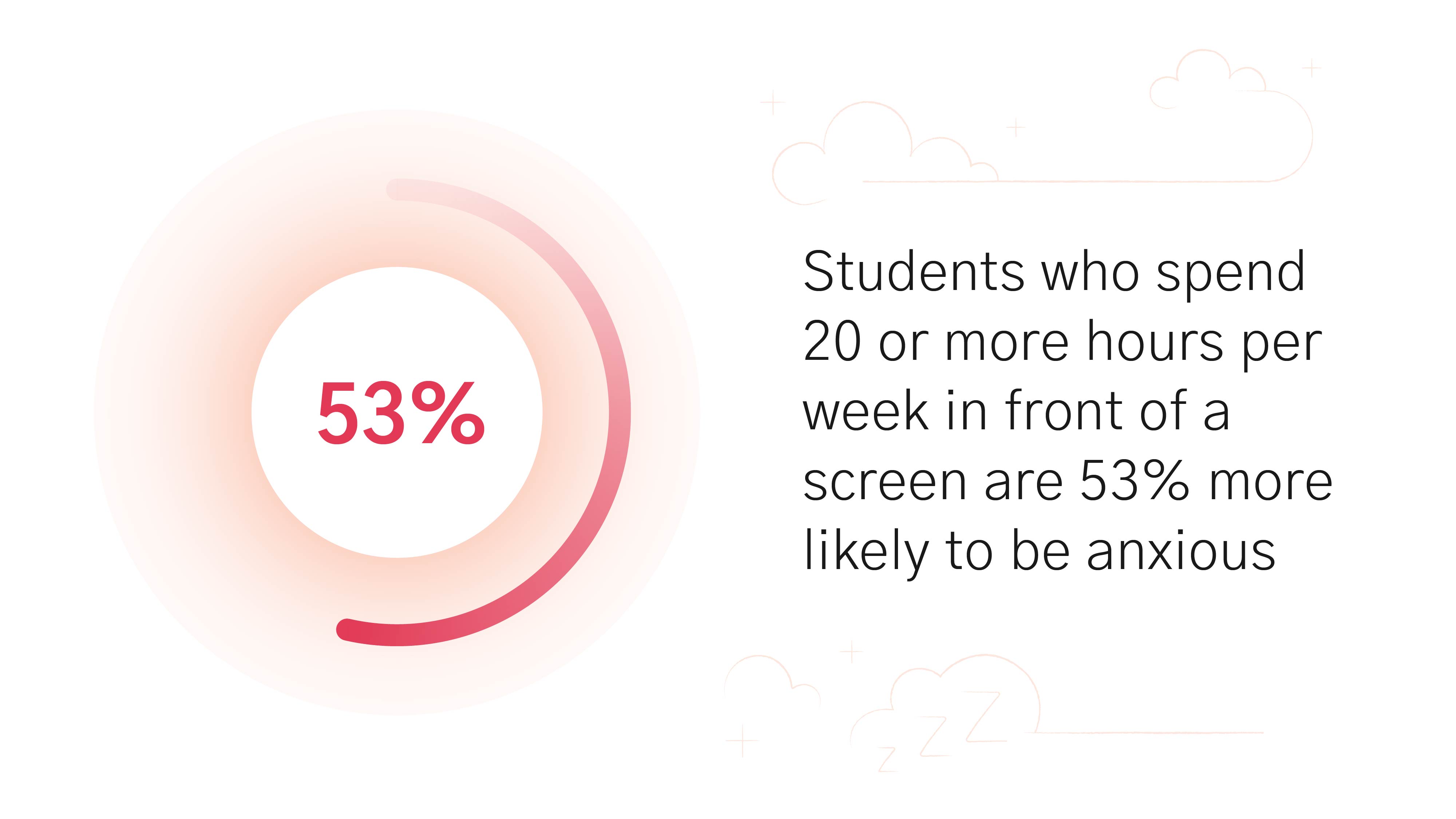
Relax
Most often, insomnia is caused by anxious thoughts. Putting these repetitive thoughts to rest can do a lot for your sleep health. Try to meditate before going to sleep, or write in a journal to dispel any worries you might have.
A warm shower can prepare your body for sleep as well— your body temperature naturally lowers as it gets ready to fall asleep, and a shower will kickstart this cooldown process.
Studies have shown that keeping your bedroom at a moderate temperature promotes better sleep. A too hot or too cold bedroom is linked to decreased REM sleep and slow-wave sleep. It seems the ideal temperature for relaxing sleep is between 60-67 degrees.
Eat Sleep-Promoting Foods
When you want more rest, your sleep environment is a great place to start, but paying attention to your eating habits could be the difference between a good or bad night of sleep.
The best foods for sleep contain vitamins and minerals that promote sleep mechanisms in the body. These include the following:
| Foods with Tryptophan | Foods Promoting Tryptophan | Calcium & Magnesium-Rich Foods | Foods with Melatonin | Foods Promoting Serotonin |
|---|---|---|---|---|
| Low-fat milk Turkey Eggs Nuts Beans Low-fat cheese Fish |
Peanut butter and whole-grain crackers Avocado toast Low-fat cheese and whole grain crackers Chia seeds with low-fat milk |
Yogurt Low-fat milk and cheese products Leafy greens Almonds and cashews Sweet potatoes Dark chocolate Bananas Whole grains |
Cherries Tart cherry juice Bananas Pineapple |
Kiwi Fish Turkey Oats Spinach |
Tryptophan
Tryptophan is an amino acid in our bodies that helps produce serotonin, a neurotransmitter that promotes deep and restful sleep. Tryptophan is found in certain foods as well, making this natural sleep aid readily available (as long as you’re not allergic to the foods containing tryptophan).
Many foods with tryptophan also promote good bone health thanks to the calcium and vitamin D found in them.
Some foods contain tryptophan, while others encourage its production in the body. The best tryptophan-promoting snacks are whole grains and proteins, such as crackers and cheese. On top of promoting tryptophan production, healthy combinations of protein and complex carbohydrates create a feeling of satiety in the body without causing reflux or poor digestion, which can interrupt sleep.
Calcium and Magnesium-Rich Snacks
Many poor sleepers have begun to turn to magnesium supplements to help them fall asleep faster. Magnesium is a mineral that, when consumed, encourages the release of GABA. GABA is another neurotransmitter released by the brain to calm and relax the body, preparing it for sleep.
Our bodies need magnesium to absorb calcium. Additionally, combining magnesium with calcium regulates heartbeat, muscle contractions, and the nervous system— all of which play a large part in helping us sleep. Instead of taking calcium-magnesium supplements, you can eat foods containing calcium and magnesium for a healthy evening snack.
Foods Containing Melatonin
If you’ve done any research on sleep, you’ve probably heard of melatonin and serotonin. Melatonin is a hormone that regulates the sleep-wake cycle— melatonin supplements are popular with insomnia-sufferers, although the body does not always respond to them it would naturally occurring melatonin.
A healthier approach is to try foods containing melatonin, such as cherries, bananas, or pineapple (avoid the latter if you experience acid reflux issues). Avoid melatonin supplements if you can, since the body can actually become resistant to them and the sleep cycle can quickly get out of whack.
Foods that Promote Serotonin
Serotonin is another important neurotransmitter that influences sleep. It’s largely responsible for our mood, but it’s also the precursor to melatonin production. Without it, our sleep-wake cycles would be irregular. While serotonin is not found in any foods, plenty of healthy snacks promote its production in the body, such as kiwi, turkey, and spinach.
Avoid Certain Foods
You already know that poor sleep can affect your food choices during the day— if you’re tired, it’s more likely that you’ll choose fatty, sugary junk food to boost your energy. You’re also less likely to get sufficient exercise because of fatigue, leading to weight gain and poorer sleep.
Foods high in sugar can make you feel lethargic, prompting you to eat even more sugar and initiating a poor eating cycle. Choose snacks of protein and whole-grains, especially close to bedtime, to keep you full without affecting your sleep.
Avoid acidic and spicy foods before bed, such as orange juice, tomatoes, or garlic, as these can cause acid reflux or stomach ache.
Use a Sleep Tracker
Knowing how much sleep you’re getting will help you see the gaps in your cycle and adjust accordingly. There are tons of free apps you can download to your phone that track your sleep patterns every night— some are basic, simply showing you how many hours of sleep you get each night. Others track how much time you spend in each sleep phase, your heart rate, and the time you spend in bed vs. the time you spend actually sleeping.
Use White Noise
Maybe you’re one of those sleepers who needs complete silence when you go to bed. However, sleeping with ambient sounds in the background, also known as white noise, can improve sleep. White noise machines or apps are becoming more and more popular— 5% of Americans now use “sound conditioners” to help them sleep, according to the National Sleep Foundation.
White noise blocks out disruptive noises and help the user fall asleep quickly. If you’ve never used white noise to fall asleep, it wouldn’t hurt to try it out!
Choose the Right Mattress
If you’re a student, you’re probably used to falling asleep in unusual places— at your desk, on the couch, or on the floor if you don’t make it to your bed.
Obviously, the ideal place for sleep is on a comfortable mattress— what’s more, the mattress should support your posture and keep you from waking up stiff or in pain. Choosing the best mattress comes down to many factors, such as sleeping position, mattress age, and budget.
If you’re a college student, you may be sleeping on a mattress provided by your apartment complex or dorm, and you can’t really control the type of mattress you get. If this describes your situation, you can do a few things to adjust the comfort level of your mattress.
First, try a mattress topper. Most toppers are made using gel-infused memory or latex foam, so they’re cooling and pressure-relieving. They’re affordable for most student budgets and easy to use— just place them on top of your mattress and cover everything with your mattress protector or sheets.
You can also try flipping or rotating your mattress— the side you’re sleeping on may be worn down and unsupportive.
If you have the option to use your own mattress, you’ll have a bit more control over how comfortable your sleep is. First, choose the right firmness— the most comfortable firmness mostly depends on your sleeping position.
| Dominant Sleeping Position | Suggested Mattress Firmness |
|---|---|
| Side | Medium or medium-soft |
| Back | Medium or medium-firm |
| Stomach | Medium-firm or firm |
| Combination | Medium, medium-soft, or medium-firm |
Next, consider the age of your mattress. If you’re bringing the mattress you’ve slept on since childhood to college with you, it might give you some sleeping issues later on. Most good-quality mattresses need replacing after 7-10 years. When the bed starts sagging or loses its support, it’s time to replace it.
Researchers who conducted a 2007 study learned that an older mattress (about 10 years old) can cause pain and stiffness, diminishing sleep quality and comfort. On the other hand, study participants who slept on a new bed adjusted quickly to the new feel and their sleep comfort and quality improved.
Now, one of the most important considerations for students is their budget. Most students are focused on buying textbooks, paying tuition, and paying rent— a new mattress is the last thing on their minds. The good news is you don’t have to spend a ton of money on a good-quality mattress.
A twin-size memory foam mattress costs as little as $300, and while it might not last you forever, it should hold up through your college years, giving you the sleep you need. After you graduate, you can upgrade to an even comfier bed.
Adjust Weekend Sleep Habits
The idea that you can “catch up on sleep” is a myth— your sleep debt, or accumulated hours of lost sleep, can only be “repaid” by gradually getting more and more sleep each night. That means you can’t just sleep all day on Saturday and feel refreshed; in fact, oversleeping has its own downsides. What’s more, sleeping in on weekends may be bad for your heart, according to a 2017 study.
Accumulated sleep debt can make you feel jet-lagged, even if you haven’t gone anywhere! The best thing you can do to get back on track is to stick to a steady sleep schedule— even on the weekends. Sleeping in and then staying up late will only throw off this routine, setting you up for more sleep deprivation during the week.
For the best health, maintain healthy habits all week, not just on the weekends— prioritize exercise, sleep, and nutrition every day for a better quality of life.
Exercise for Better Sleep
We could write another article about the benefits of exercise, but for now, we’ll stick to how regular exercise can improve your sleep.
Surprisingly, there isn’t a lot of research out there yet exploring the connection between exercise and sleep. However, the studies that have been done find that exercise promotes sleep efficiency and helps us fall asleep faster.
Ironically, the main obstacle keeping us from exercise is tiredness or fatigue. Students already have full schedules— fitting exercise into the mix can be difficult. The good news is exercising for as little as 20 minutes a day has been shown to positively affect sleep patterns.
The Downsides of Too Much Sleep
We’ve talked a lot about sleep deprivation, but what about its opposite— is getting too much sleep possible?
It turns out the effects of sleeping too much are nearly identical to the effects of sleeping too little. That’s because both of them throw off your circadian rhythm, which is the catalyst for so many other important processes in your body.
A study published in 2014 learned that oversleeping can increase the likelihood of developing psychiatric diseases and developing a high body mass index (BMI). Another study published in the Sleep journal compared the sleep patterns of teenagers and elderly— two groups who experience deep shifts in their circadian rhythms as they age— and discovered that “too much sleep” caused cognitive deficiencies in both groups.
Your body may need more sleep at certain times, like during pregnancy or illness. However, if you’re relatively healthy, the amount of sleep you get each night shouldn’t vary.
In 2014, the National Sleep Foundation recommended new sleep times based on a report published in Sleep Health. The table below shows the current recommended sleep times based on age and the previously recommended sleep times— you’ll notice some sleep times have decreased, while others increased. Categories marked in bold are newly created.
| Age Group | Current Recommended Sleep Time | Previous Recommended Sleep Time |
|---|---|---|
| Newborns | 14-17 hours per day | 12-18 hours per day |
| Toddlers (1-2 years) | 11-14 hours per day | 12-14 hours per day |
| Preschoolers (3-5 years) | 10-13 hours per day | 11-13 hours per day |
| School-aged children (6-13 years) | 9-11 hours per day | 10-11 hours per day |
| Teenagers (14-17 years) | 8-10 hours per day | 8.5-9.5 hours per day |
| Young adults (18-25 years) | 7-9 hours per day | n/a |
| Adults (26-64 years) | 7-9 hours per day | 7-9 hours per day |
| Elderly (65+ years old) | 7-8 hours per day | n/a |
What are the benefits of a good night’s sleep?
A “good night’s sleep” means much more than getting your recommended 7-9 hours. It means staying asleep all night so your body can restore and repair itself. Based on the research in this article, a good night’s sleep can lead to better grades, higher memory retention, healthier eating choices, and lower risk of diseases such as obesity, heart disease, and cancer. That’s plenty of motivation to get to bed on time!
What time should I go to bed?
Your bedtime will vary depending on your schedule and life circumstances. You should start preparing for bed about an hour before you actually get into bed and fall asleep. As soon as the sun goes down, your body will begin its own processes of shutting down, so don’t prolong your wake time with blue light-emitting devices or bright lights.
Keeping physical activity to a minimum before bed can help too, since this will raise your heart rate and body temperature, keeping you awake past your bedtime. If you’re going to exercise, try doing it at least 2-3 hours before bedtime.
Does more sleep help you focus?
Yes! Research shows that a complete night of rest emits brainwaves that convert your short-term memories to long-term ones, helping you focus more during the day and retain new information.
Does sleep affect school performance?
Yes, research has shown that consistent sleep can improve grades because it increases retention, attentiveness, reaction time, and overall cognitive performance. On the other hand, lack of sleep has been shown to negate these effects and actually make us much less productive.
Conclusion
No matter if you’re a busy student or just struggling to manage your time each day, your sleep is probably affected by all the changes and stress you’re experiencing. It’s normal to miss out on some sleep every once in a while, but too much sleep deprivation can lead to much riskier health problems, such as brain disease, heart disease, and lowered immunity.
Getting enough sleep isn’t just a good idea— it can improve your academic performance, your productivity, and your mental health. Establish healthier sleep habits today to reap these benefits as soon as you can.
Reprinted courtesy of https://savvysleeper.org/

